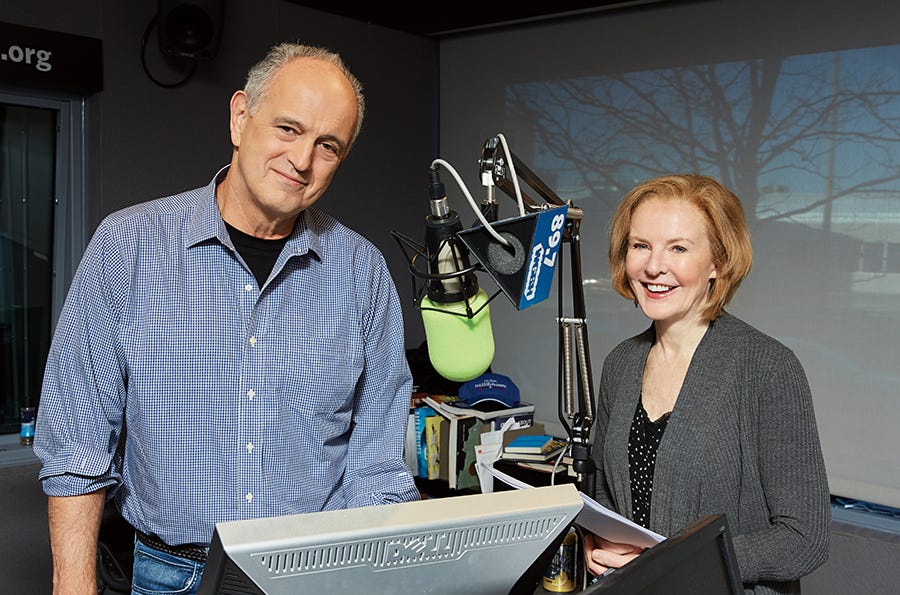09.30.2024
Years after pot legalized, cannabis cafes nowhere close to approval | Law360 strike ends in win for union | All progressive, all the time at GBH’s Boston Public Radio |
News tips? Story ideas? Email us at sbvanvoorhis@hotmail.com
Public radio or progressive monotone? As Boston mayor pushes a controversial and potentially catastrophic tax plan, she can count on cheerleading from the hosts of GBH’s flagship local talk show
Just call it Boston Public Progressive Radio
On Friday, Boston Public Radio’s Jim Braude and co-host Andrea Cabral rushed to defend Boston Mayor Michelle Wu’s toxic tax plan to plug a looming $1.5 billion revenue gap.
The shift to remote work has pummeled office towers, wrecking a long-time cash cow for city tax coffers.
However, business leaders have warned that Wu’s proposed solution - doubling down and attempting to squeeze every last penny out of struggling downtown office buildings - could backfire badly, driving companies and jobs out of Boston.
But Braude & Co. barely acknowledged those concerns during a discussion of the mayor’s plan, which came as talks heated up last week between Wu and Statehouse leaders, whose ok she needs to move ahead.
The BPR hosts were too busy amplifying the mayor’s specious argument that her plan is the only way to head off a 33 percent tax hike on Boston homeowners, including vulnerable seniors.
Gone unmentioned: Wu’s extreme refusal to consider any cuts to a city budget set to rise by more than 8 percent, or to tap into hundreds of millions in reserve funds set aside for just such an emergency.
Maybe somewhat disingenuously, given the politics involved, Braude insisted that he was not arguing over the merits of the mayor’s uber progressive plan, which, unfortunately given the stakes for all involved, he claimed “not to understand well.”
Rather, Braude, who got his start as a progressive political activist and then a Cambridge city councilor before turning to journalism, said his issue is the fact that Wu and other local leaders can’t tax and regulate as they would like, but instead must seek state approval on some issues.
In regards to her tax proposal, Wu needs Statehouse approval since it requires shifting a greater proportion of the city’s tax load onto commercial properties than currently allowed under state law.
Braude noted he has been similarly outraged over the fact that city leaders in Boston and Somerville also need State House approval to bring back rent control - the holy grail of progressive politics.
“I have said this 100 times, the notion that the elected mayor of the city of Boston has to go beg the Legislature to let her do what she wants to do within the city she was elected to run,” Braude said.
“She was elected to run the damn city,” Braude fumed. “Karen Spilka [Senate President], where is she from, Ashland or something? was not elected to run Boston, she was elected to run state affairs,” Braude said. “It is amazing there’s not more of an uproar among local officials.”
For her part, Cabral, a former state public safety chief and occasional BPR host, chimed in with what she clearly believed was a damning detail.
“The people who own that property don’t live in Boston,” Cabral said, though the same could be said of innumerable top executives whose companies have huge investments - and stakes - in the Boston’s economic future.
Yet Boston is not some modern day Italian city-state or some precious progressive principality, free to chart its own path in the world and make whatever economically destabilizing decision it so desires, the rest of the state be damned.
The last time we checked, Boston is not some Berkshire hamlet, but the state capital and a key part of the Commonwealth of Massachusetts, soaking up hundreds of millions in state aid for its struggling schools each year.
It would have been nice to hear some pushback against the Braude and the Wu cheerleading section on Boston Public Radio.
Globe business columnist Shirley Leung did offer a modest dose of badly needed reality. Business leaders are questioning whether Wu’s plan is “the only solution… at a time when property values are going down and people are not going back to the office,” Leung noted. “They are under some financial pressure.”
Ok, fine. But would it really be so hard to get a business leader, or a moderate Democrat or Republican pol, to offer a more forceful and more extensive response on a pretty crucial issue?
After all, what is local public radio for, if not a lively discussion of an issue of regional importance, impacting not just Boston homeowners, but many, many others whose livelihoods are tied to the fortunes of the city and its businesses?
If nothing else, it would make for a livelier discussion than just hearing the same self-righteously predictable opinions, voiced over and over and over.
Oh yeah, but we forgot, it’s not public radio anymore, but progressive radio. And on progressive radio, only the faithful listen and dissenting opinions are only acknowledged to be ridiculed.
What’s the holdup? Would-be pot entrepreneurs in Massachusetts left waiting for years for a green light to open cannabis cafes



